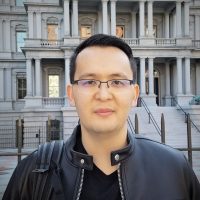Machine Learning-Enabled Electrical Impedance Tomography for Single Cell Imaging

Speaker: Ablaikhan Akhazhanov
Affiliation: Ph.D. Candidate
Via Zoom Only: https://ucla.zoom.us/j/9977205304
Abstract: A biological cell is the elementary unit of life. Despite being actively studied for the last three centuries, many details of how cells are organized remain mysterious. One of the reasons in conventionally accepted optical microscopy that imposes high costs on experimental studies, limits scalability, and slows down the progress. In order to address this, numerous label-free imaging techniques were proposed by the biomedical engineering community. Among them is electrical impedance tomography (EIT), a low-cost and label-free imaging method based on electrical stimulations. Mathematically, EIT is ill-posed which severely limits its applications. Moreover, it was initially developed for human thorax imaging and its micro-scale version is yet to be established. In this dissertation, we shrink EIT for single-cell applications and demonstrate how to image a cell and its interior organelles using only a few microelectrodes.
We start by studying electrical properties of cells and build a scalable model of cellular electrical response. The proposed method mimics biodiversity among four common cell types and accurately represents complex three-dimensional geometries. By combining it with modern shape optimization methods and a customized microelectrode array we extend EIT to single-cell imaging. Along the way, we provide solutions to several well-known EIT problems such as low contrast images and numerical instability. To further expand cellular EIT to nucleus imaging we take a data-driven approach. We explore a variety of machine learning methods previously applied to inverse imaging problems and discuss their pros and cons. We then propose a novel deep learning model specifically adjusted for EIT. Finally, we evaluate and experimentally demonstrate live cell nucleus imaging driven by pure electrical excitations and the proposed deep neural network.
Biography: Ablaikhan Akhazhanov received his B.S. degrees in Electrical Engineering and Economics in Kazakhstan and Russia in 2012 and then spent two years working on Big Data projects in telecommunications industry. Later, he received M.S. degrees in Electrical Engineering and Statistics at UCLA and is now working towards Ph.D. degree under supervision of Prof. Chi On Chui in Nanostructure Devices and Technology Laboratory (nanoDTL). During his PhD journey, Ablai spent a summer at Visa Research where he developed a novel generative deep neural architecture (patented), was actively involved in teaching, and participated in the world finals of autonomous drone racing competition organized by Lockheed Martin, Nvidia, and Drone Racing League. Ablai has broad research interests in bioelectronics, data-driven learning methods, and machine intelligence. His PhD studies were supported by NSF, Alem Saby scholarship, EducationUSA, DAAD, and ECE department. Ablai enjoys teaching, hiking, and spending time with his family.
For more information, contact Prof. Chi On Chui (chui@ee.ucla.edu)
Date/Time:
Date(s) - Jun 02, 2020
4:00 pm - 6:00 pm
Location:
Map Unavailable
